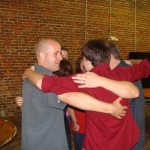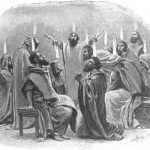Craig Blomberg on the Meaning of ekklesia
Following my previous post (“David Thomas on the Meaning of ekkklesia“), I thought I would post a quote from a more recent commentary.
This time, the quote is from Craig Blomberg in his commentary on Matthew (NAC 22; Nashville: Broadman, 1992). Blomberg is commenting on Matthew 16:16-18. He defines the Greek term á¼ÎºÎºÎ»Î·ÏƒÎ¯Î± (ekklesia – normally translated “churchâ€) here because it is the first occurrence of the term in the Gospel of Matthew.
Here is the quote:
So what does Jesus promise Peter? He will be the foundation on which Christ will build his “church.” Here is the first use of ekklesia in the Gospels. It occurs only three times, all in Matthew, and the other two references are both in 18:17. Many hold that Jesus did not conceive of establishing a church and that these verses are later Matthean insertions. But the nature of Jesus’ instruction to his community of followers certainly implied their continued existence in some form, even if there is little of an “institution” yet in view. Moreover, the word ekklesia in Hellenistic Greek often simply meant an assembly… The popular view that the church is somehow to separate itself from society, based on the derivation of ekklesia from ekkaleo (to call out) affords a classic example of what linguists call the etymological fallacy. Words often develop meanings over time that differ from their roots. They only sense in which the word church in New Testament times means those who are called out is that believers routinely gather together by leaving their separate places of residence or work. (p 252-53) (italics in original)
Blomberg explains that the ekklesia (assembly) of God is different from all other ekklesiai because it is composed of those who submit themselves to the rule of God in their lives (i.e., the kingdom of God).
Love for one another is the truest praise
Strider at “Tales from Middle Earth” recalls a recent opportunity to speak “On the Church.” He had the opportunity to speak to and answer questions from a small group of believers. I love that the focus of his talk was on the “true nature of the Church.” He writes:
I was invited to speak to a small church yesterday. It was a good day as we spent about 7 hours together discussing all kinds of things. I was supposed to talk about Church Planting and we did some, but much of the day was spent with their questions. They asked about everything from, ‘who are those Sons of God things that come and breed with women in Genesis 6?’ to ‘If a guy becomes a believer but he has several wives what do we do?’ It was some good discussion but the best part was definitely in talking about the true nature of the Church. They,like so many here, have been established by foreigners who built a building, registered an organization,and then declared it ‘church’. It was great to see their faces light up when they found out that the Church is actually a community of the redeemed, that their love for one another is the very truest praise for our Father, and that Jesus Kingdom is not a meeting or a meeting place but the reign of God in our lives right now. Buildings and meetings are not good or bad, they are irrelevant to the love relationship we are to have with one another. It is remarkable to me how many people there are out here who have come to plant churches but have never really thought through- much less prayed through and did biblical study on- what a church is.
There are some great statements here: “The Church is actually the community of the redeemed.” “Their love for one another is the very truest praise for our Father.” “Jesus Kingdom is not a meeting or a meeting place but the reign of God in our lives right now.”
I hope more and more people begin to understand and to live their identity as the church of God, and that our love for one another will become more and more praise to God.
David Thomas on the Meaning of ekklesia
David Thomas (1813-1894) first published his commentary on The Gospel of Matthew at the end of the nineteenth century. I ran across this commentary in my research for my dissertation.
In his comments on Matthew 18:15-20, Thomas begins by defining the Greek term á¼ÎºÎºÎ»Î·ÏƒÎ¯Î± (ekklesia – normally translated “church”). He defines the term here because it is one of only two occurences of the term á¼ÎºÎºÎ»Î·ÏƒÎ¯Î± (ekklesia) in any of the four Gospels.
Here are his comments:
It seems necessary, at the outset or our endeavour to reach and develop the spirit of this passage, to get a clear and a definite idea of the thing which Jesus here designates á¼ÎºÎºÎ»Î·ÏƒÎ¯Î± —the church. It is scarcely necessary to remark that the simple meaning of the word is an assembly… The term is never used to designate a building, a class of religious functionaries, or a system either of doctrine or of worship. In the Christian sense it means nothing more than an assembly of Christians. The assembly may be large or small, held in a city or a village, in a public building or in the open air. (pg 359) (italics in original)
The more I read older commentaries, the more I find comments and definitions like this. As a definition of á¼ÎºÎºÎ»Î·ÏƒÎ¯Î± (ekklesia), “assembly” is much better than “called out ones,” which relies primarily on etymology instead of usage.
The Church is a Who?
I really appreciated this video from Rick at “The Blind Beggar” in a post called “the church: a who, not a what.”
(Apparently, Rick got the video from another blogger in a post called “What is the church?”)
(Or you can view the video directly from vimeo, where it’s called “When We Say Church.”)
My favorite part of the video is this: Several people speaking the following definition and description:
“The church is people… believing God… following Jesus… filled by the Spirit… loving each other… serving the city… changing the world.”
So many things would change if we really believed (by living) that the church is people.
Is This Church?
So, you’re getting together with another brother or sister in Christ. Is this church? Are you church?
What would make you church and what would make you not church?
Do certain things have to happen? Should certain things not happen?
Does your meeting need to be at a certain time or place for you to be church together? Can it not take place at certain places or certain times for you to be church?
Are you church together only with certain brothers and sisters in Christ?
What makes a group (two or more) church?
The Church or Two Churches?
Four years ago, when this blog was just getting started – back when I only posted a few times each month – I wrote a short post called “The Church or Two Churches?” about the use of the term “church.” I think this is a good question for us to consider.
——————————————–
According to Romans 16, within the city of Rome there was a church that met in the home of Priscilla and Aquila (Rom 16:5). There was also a church that met with Asyncritus, Phlegon, Hermes, Patrobas, and Hermas (Rom 16:14). Finally, there was a church that met with Philologus, Julia, Nereus and Olympas (Rom 16:15).
Paul recognized each of these groups as the church.
Based on Paul’s use of ekklesia (“church”), when two of these groups met together, would Paul have recognized the combination as the church, or two churches?
I believe he would have recognized them as the church, not two churches.
If this is true, what are the implications for the church today?
Go to Crowd
Title sounds strange, huh? Try out these others:
Where do you go to crowd?
It’s time for students.
What did you do in coworkers today?
Let’s go to family.
Go to actors.
This phrases sound strange, because you expect a place or event, but the words all refer to groups of people. But, people often use the same phrases with the term “church”:
Where do you go to church?
It’s time for church.
What did you do in church today?
Let’s go to church.
Go to church.
So, why do this phrases sound okay while the first list sounds strange? Because, while we give it lip service, we don’t actually think of “church” as referring to a group of people. We still think of “church” as referring to an event or a place or an organization.
And, this carries over when we read Scripture. We read the word “church” and think about a place or an event or a time or an organization, but not a group of people.
Yes, we say that we know that “church” refers to people, but we continue to use the word to refer to places and events and times.
Local or Universal?
I wrote the post “Local or Universal?” about three years ago. This post (sorta) goes along with my previous post “Immediate Membership.” I’d love to hear your thoughts about this.
—————————————–
I rarely talk about the “local church” as opposed to the “universal church”. I do not think these are valid distinctions, because I do not believe that Scripture makes such a distinction (more about that later). So, how do I distinguish between the “local church” and the “universal church”? I don’t. There is simply the church. This topic came up recently during break in one of my seminars. I was excited to hear another student (you know who you are) voicing my concerns and beliefs about the local/universal distinction.
The “local church” is usually defined as that group of believers that are somehow connected to one another. Perhaps this connection is made through joint membership (i.e. their name on a role), or a covenant (i.e. everyone agrees with a certain statement), or regular attendance at a certain location at a certain time.
The “universal church” is usually defined as all believers of all time. This is sometimes viewed as an “eschatological” (that is, end times) reality, but not a current reality.
Sometimes, these distinctions (“local” and “universal”) are combined with the distinctions of “visible” and “invisible”. Sometimes these two groups of distinctions are separate.
When we read Scripture with this understanding of “local church” and “universal church” in our “hermeneutical lens” (that is, the presuppositions through which we read Scripture), we often have to do textual gymnastics to understand what the author is trying to say.
For example, many who hold to a “local church” also understand baptism as the ordinance of entrance into the local church – whether believer’s baptism or infant baptism. Thus, when they read a passage such as 1 Corinthians 12:13 (“For in one Spirit we were all baptized into one body – Jews or Greeks, slaves or free – and all were made to drink of one Spirit.”), they must see this as entrance into the “universal church” not the “local church”. Why? Because this verse is talking about Spirit baptism, not water baptism. So, it cannot be talking about the “local church”.
However, throughout 1 Corinthians, Paul is talking to and about a “local” group of believers. It is a group of believers in Corinth who are “not lacking in any spiritual gift” (1 Cor 1:7) and should have “no divisions” (1 Cor 1:10). It is this same local group that must deal with an immoral person among them (1 Cor 5:4-5). This same group of believers in Corinth needs to learn how to deal with brothers or sisters who disagree with others about meat sacrificed to idols (1 Cor 8-10). This is the same “local” group who is having problems with the Lord’s Supper (1 Cor 11:20-22). Finally, it is to this same group in Corinth that Paul begins teaching about spiritual gifts (1 Cor 12).
Each member of this “local church” has been given a gift by the Holy Spirit for the benefit of others (1 Cor 12:4-11). This is the group of believers who are members of one another and members of Christ (1 Cor 12:12). This group obviously knows one another in order to recognize one another as members of the body and recognize each one’s function (i.e. “ear”, “eye”, “foot”, “hand” – 1 Cor 12:14-21). God has placed each of them together according to his will and his purposes (1 Cor 12:18).
Therefore, in order to make 1 Corinthians 12:13 fit into a “local church” and “universal church” distinction, we have to take it out of its context.
But, what happens if we recognize that Scripture does not make a distinction between the “local church” and the “universal church”? What happens if we recognize that at the moment that we are indwelled by the Holy Spirit we immediately become “members” with all believers with whom God brings us into contact? What happens if we accept responsibility for all of our brothers and sisters that God brings into our lives? Suddenly, we do not have to take this Scripture out of context. In fact, it makes perfect sense within its context. (This is not the only example, just one from a passage that I’ve read recently.)
Does this mean that we should not meet regularly with certain believers? Certainly not. It seems that believers did meet together in different venues and perhaps even in different groups. However, it does mean that we should recognize our relationship with one another not based upon man-made regulations, but upon God’s choosing – For in one Spirit we were all baptized into one body…
Does this mean that I am responsible for the believer on the other side of the world whom I have never met? Certainly not. But, it does mean that I am responsible for the way that I relate to the believer across the street, or across the hall, since God has brought me into contact with that person. If God desires for me or you to interact with this person, then God will bring us together – God arranged the members in the body, each one of them, as he chose…
It seems to me that the “local church” and “universal church” distinctions adds very little to our biblical understanding of God or of the church. Instead, it seems to divide the church into little groups that feel that they are maintaining unity in the body of Christ as long as they are united withing their “local church”. Meanwhile, it also allows believers to ignore the “one-anothers” of Scripture if the “one-another” does not “belong” to their “local church”.
This does not mean that I am “against” covenants or “against” a group of believers organizing together with a membership. I think that both of these things can be good. However, I also recognize that both covenants and organizations with membership can lead to exclusivism and isolationism, neither of which are characteristic of the church in Scripture.
Can I be wrong about this? Yep. Does it concern me that many believers do not agree with me? Yes, it does. Am I open to hearing different opinions? Yes. Do I welcome disagreements here on this blog? Yes, feel free to disagree, as long as you don’t mind your opinion being questioned as well.
Viola and Cole Defining Church
On his website “Reimagining Church,” Frank Viola has published an interview with himself and Neil Cole. (See “Neil Cole & Frank Viola Discuss Missional Organic Church.”) I love the way they each define “church”:
Neil Cole: In CMA, we have defined church this way: The presence of Jesus among His people, called out as a spiritual family to pursue His mission on this planet. Church begins and ends with Jesus among us. All the typical ingredients listed to describe church were in the upper room in Acts chapter one but the church really began in Acts chapter two when only one other important ingredient was added: the Spirit of God showed up! God among us is what makes us any different from the Elks Club.
Frank Viola: I’ve been using the word “organic church†or “organic expression of the church†for over 16 years. And I give credit to T. Austin-Sparks for the phrase. For Sparks and I, an organic church is a group of Jesus followers who are discovering how to live by Divine life together and who are expressing that life in a corporate way… Consequently, when God’s people learn how to live by the indwelling life of Christ together, a certain expression of community life naturally emerges. So for me, the word “organic†has to do with life – God’s life. The organic expression of the church comes up from the soil; it’s not mechanical. While it has organization (or an expression) – as all living organisms do – the organization (or expression) comes about naturally from the life, not through human manipulation, religious ritual, or legalism.
The entire interview is very good. You should read it.
The Spirit and the Church
Four years ago, in the early days of this blog, I wrote a series called “Defining the Church.” I should probably re-write that series, because my understanding of the church has changed some as I’ve continued to study Scripture. In that series, I looked at various passages of Scripture to help me define the church. One of the posts (“Defining the Church 4“) dealt with Acts 1-2 and the work of the Holy Spirit in defining the church.
——————————————
So far (Defining the Church part 1, part 2, part 3), we have examined the gospels (Matt 16:15-99, 18:15-20; John 15-17) in order to define the church (εκκλησία = “assembly, community”). The main points are that the church belongs to Jesus and is created by Jesus. He builds the church of those who believe and follow Him, and He promises that death will not defeat the church. Finally, Jesus gathers the church together in order for the church to obey Him, to represent Him, and to demonstrate His character.
In Acts 2:42-47, Luke presents a beautiful image of the church. Many look to this picture to define the church; however, it seems that Luke was showing what happened as a result of believers being the church. In other words, since believers were gathered as the church, they “continued steadfastly in (“were faithful to”, “were devoted to”, “persevered in”) the apostles’ doctrine and fellowship, in the breaking of bread, and in prayers” (Acts 2:42). Continuing in the Apostles’ teaching, fellowship, breaking of bread, and prayers did not MAKE them the church, nor do these activities define the church. Instead, the church, when built and gathered by Christ, will demonstrate these activities, among many others. As an analogy, rain is not defined by the ground being wet; however, when it rains, the ground usually becomes wet.
So, what can we learn from the first two chapters of Acts that will help us define the church? As I read the first two chapters of Acts, there is a theme that may aid us in our study of the church. Notice the passages of Scripture below (emphasis added):
The former account I made, O Theophilus, of all that Jesus began both to do and teach, until the day in which He was taken up, after He through the Holy Spirit had given commandments to the apostles whom He had chosen… (Acts 1:1-2)
And being assembled together with them, He commanded them not to depart from Jerusalem, but to wait for the Promise of the Father, “which,” He said, “you have heard from Me; for John truly baptized with water, but you shall be baptized with the Holy Spirit not many days from now.” (Acts 1:4-5)
But you shall receive power when the Holy Spirit has come upon you; and you shall be witnesses to Me in Jerusalem, and in all Judea and Samaria, and to the end of the earth. (Acts 1:8)
When the Day of Pentecost had fully come, they were all with one accord in one place. And suddenly there came a sound from heaven, as of a rushing mighty wind, and it filled the whole house where they were sitting. Then there appeared to them divided tongues, as of fire, and one sat upon each of them. And they were all filled with the Holy Spirit and began to speak with other tongues, as the Spirit gave them utterance. (Acts 2:1-4)
But Peter, standing up with the eleven, raised his voice and said to them, “Men of Judea and all who dwell in Jerusalem, let this be known to you, and heed my words. For these are not drunk, as you suppose, since it is only the third hour of the day. But this is what was spoken by the prophet Joel: ‘And it shall come to pass in the last days, says God, That I will pour out of My Spirit on all flesh; Your sons and your daughters shall prophesy, Your young men shall see visions, Your old men shall dream dreams. And on My menservants and on My maidservants I will pour out My Spirit in those days; And they shall prophesy…’ ” (Acts 2:14-18)
(Peter still speaking) This Jesus God has raised up, of which we are all witnesses. Therefore being exalted to the right hand of God, and having received from the Father the promise of the Holy Spirit, He poured out this which you now see and hear. (Acts 2:32-33)
Now when they heard this, they were cut to the heart, and said to Peter and the rest of the apostles, “Men and brethren, what shall we do?” Then Peter said to them, “Repent, and let every one of you be baptized in the name of Jesus Christ for the remission of sins; and you shall receive the gift of the Holy Spirit. For the promise is to you and to your children, and to all who are afar off, as many as the Lord our God will call. (Acts 2:37-39)
In summary, Jesus commands the believers to wait in Jerusalem until He sends the Spirit (the Promise from the Father). When Jesus sends the Spirit on the day of Pentecost, Peter reminds the crowd that the Spirit was promised by the prophet Joel, and that the Spirit was sent by Jesus. Peter extended Jesus’ promise – which is the Promise of the Father, which is the Holy Spirit – to all who believe, to as many as the Lord our God will call. It is only at this point – after the coming of the Spirit – that Luke describes the result: the church. All believers – the original 120 as well as the 3000 added by God – are now bound together by the same Spirit into the one church of Jesus Christ. Jesus continues to build His church – through His Spirit. Jesus continues to communicate to His church – through His Spirit. Jesus continues to abide with His church – through His Spirit.
Or, as Irenaeus said many years ago: “Where the Church is, there is the Spirit of God; and where the Spirit of God is, there is the Church.”
As Jesus (through His Spirit) gathers together those who believe and follow Him (through His Spirit), those believers will reveal His character, live according to His commands, and represent Him in the world (all through His Spirit).










